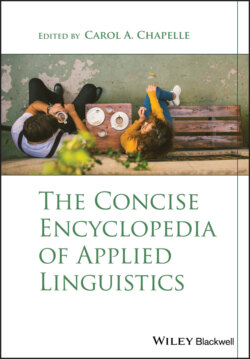Читать книгу The Concise Encyclopedia of Applied Linguistics - Carol A. Chapelle - Страница 41
Agency From Poststructuralist and Critical Perspectives
ОглавлениеThe relationship between social structure and human agency has long been debated within social theories. While phenomenology and ethnomethodology focus on the subjective world of humans and privilege the actor, functionalism and structuralism stress the power of the structure and systems of meaning to control agency. Bourdieu's (1997) and Giddens's (1984) theories offer concepts that bridge agency and structure, or the gap between the micro and macro perspectives (Smith, 2001). Bourdieu's concept of “habitus” helps us analyze how the reproduction of social structures is interconnected with individuals' subjective experiences embedded in day‐to‐day practices and manifested in embodied behaviors and tendencies to act in specific ways as well as in their tastes and emotions, among other factors. In Giddens's structuration theory, on the other hand, structure and agency are mutually constitutive within social practice. Giddens suggests that humans act by using internalized skills and knowledge in every day practice, while cultural patterns are reproduced as humans use their skills and knowledge in social practice. Thus not only is structure the medium for human actions, but it is reproduced as a result of these actions. In Giddens's view, humans continuously have reflexive moments in which they monitor the consequences of their actions while engaging in day‐to‐day practices. Through this reflexivity, humans have agency in that they can make choices and enact changes to their environment.
Both Bourdieu's and Giddens's theories thus provide a framework for viewing agency in L2 learners by focusing on the dialectic of social structure and agentive actions. Meanwhile, critical theories such as postcolonial theories and feminist theories (e.g., Weedon, 1987; Butler, 1990) supply lenses through which to examine sociopolitical discourses that produce power differences. Within the framework of SLA informed by poststructuralist and critical theories, studies have been conducted focusing on L2 learning by immigrants or those who are forced into certain subject positions in society, demonstrating their struggles in appropriating the new language while fighting social constraints and negotiating an identity (e.g., Norton, 2000; Pavlenko & Blackledge, 2004; Block, 2007). Researchers also focus on individuals' agency in critically reflecting on the positions in which they are placed and in which they must take more strategic positions in order to liberate themselves from imposed identities. In this sense, agency is not a property of free and sovereign individuals. Instead, it describes the human capacity not only to resist imposed subject positions but also to make choices and change the course of one's life, create new ways of being, and look for “cultural alternatives” (Pennycook, 1997, p. 35).
